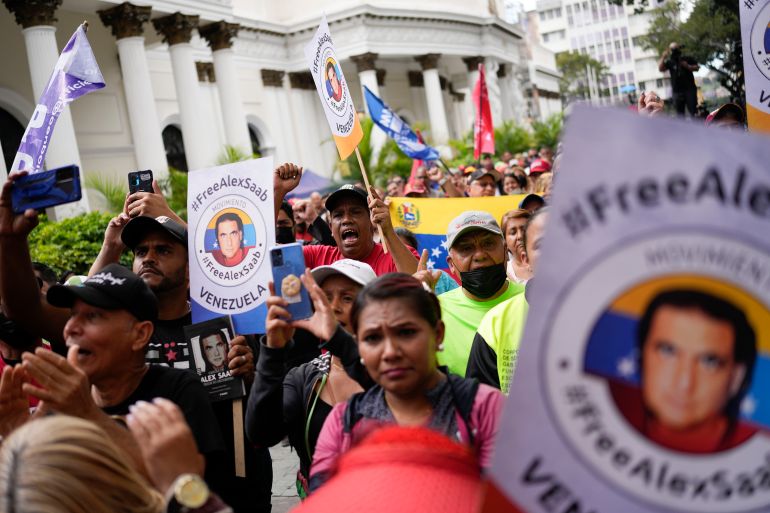US judge denies diplomatic immunity for Maduro ally Alex Saab
Saab, a close ally of Venezuela’s President Nicolas Maduro, claims he was on a diplomatic mission to Iran when arrested.

A federal judge in the United States has rejected a plea for diplomatic immunity from businessman Alex Saab, a close ally of Venezuela’s left-wing President Nicolas Maduro.
Lawyers for the Colombian-born Saab, 51, have argued that the charges against him should be dismissed, as he was acting as a diplomat for the Venezuelan government.
Keep reading
list of 3 itemsVenezuelan government, opposition to resume political talks
Brazil to resume diplomatic relations with Venezuela under Lula
Judge Robert Scola in Miami, Florida, dismissed those arguments in a 15-page ruling on Friday. Scola’s ruling asserts that since the United States does not recognise the legitimacy of Maduro’s second term, the court cannot recognise Saab as a representative of his government.
“Maduro’s regime has been deemed ‘illegitimate,'” Scola wrote. “Any claim to diplomatic immunity asserted by a representative of the Maduro regime must also be considered illegitimate.”
The decision continues a nearly two-year-long legal battle over Saab, which has heightened tensions between the US and Venezuela. Saab faces one count of conspiracy to commit money laundering, which carries a maximum sentence of 20 years in prison.
The US Justice Department has accused Saab of participating in a bribery scheme that began in 2011 and continued through 2015. Prosecutors had previously requested that seven additional charges be dropped to comply with the terms of Saab’s extradition.
According to prosecutors, Saab and his associates allegedly obtained contracts from the Venezuelan government to build low-income housing but instead siphoned $350m out of the country to take advantage of favourable exchange rates.
Saab’s lawyer Neil Schuster entered a plea of “not guilty” for his client in 2021, whom he referred to as a “diplomat of the Bolivarian Republic of Venezuela”.
Saab was arrested on June 12, 2020, in Cabo Verde, an archipelago on Africa’s Atlantic coast, after the private jet he was riding stopped to refuel. He was later extradited to the US on October 16 of that year.
In Venezuela, Maduro and his allies have described Saab’s arrest as part of an “economic war” the US is waging on the socialist-led country.
“He was chased down, kidnapped and tortured for helping Venezuela,” Maduro said in the month following Saab’s extradition, while presenting a collection of letters Saab wrote at a book fair in the Venezuelan capital of Caracas.
In this week’s hearings, Saab’s defence likewise characterised the arrest as an abduction.
“It’s like if you were to kidnap someone, bring them to your home and then charge them with trespassing,” said lawyer Lee Casey.
Maduro’s government has supported Saab’s claims that he was acting as a diplomat for the Venezuelan government, saying he was en route to Iran to negotiate an oil deal at the time of his arrest.
It would have been Saab’s third visit to Iran on behalf of Venezuela, his defence argues.
To bolster Saab’s request for diplomatic immunity, Saab’s lawyers offered notes they said were diplomatic communications between Iran and Venezuela as evidence to the US court.
Saab’s defence has also claimed he was carrying a sealed letter from Maduro himself, asking Iran’s leadership to support a deal to export fuel to Venezuela. The South American country was, at the time, experiencing extreme fuel shortages, with gasoline prices climbing to $10 a gallon.
But prosecutors for the US government have cast doubt upon the authenticity of some of those documents, which include a Venezuelan diplomatic passport and a presidential decree published in Venezuela’s Official Gazette.
They allege some of that paperwork could have been falsified.
“At best he was a courier,” said assistant US Attorney Alex Kramer. “But being a courier of diplomatic letters does not make one a diplomat.”
While Saab has communicated through his lawyers that he considers himself a “loyal citizen” of Venezuela, court filings revealed that Saab may have worked as an “active law enforcement source” for the US Drug Enforcement Administration (DEA), providing information about Maduro’s government.
Saab’s defence has argued that his contacts in Maduro’s government were aware of his communications with the DEA. During those communications, representatives of the US government reportedly asked Saab to surrender voluntarily, warning that his failure to do so could result in criminal charges.
The US judge’s decision on Friday to refuse Saab’s claim of diplomatic immunity stems from a disputed presidential election in Venezuela held in 2018.
The incumbent, Maduro, successfully claimed a second six-year term in office, but controversy surrounded the vote, with two popular opposition leaders barred from running and the country’s main opposition coalition, the Democratic Unity Roundtable (MUD), boycotting the election.
Maduro assumed office in January 2019. In response, opposition leader Juan Guaidó, then-head of the country’s National Assembly, declared himself Venezuela’s interim president in defiance of Maduro’s rule.
Faced with the prospect of two Venezuelan presidents, the US chose to acknowledge the legitimacy of Guaidó’s presidency over Maduro’s. The administration of then-Republican President Donald Trump denounced Maduro’s reelection as “illegitimate”, calling the 2018 election results a “slide toward dictatorship”.
Saab’s arrest has since factored into the tense political relations between the US and Venezuela. Following Saab’s extradition to the US, Maduro’s government threatened to suspend negotiations with the political opposition in Venezuela, calling the move “an expression of our deepest protest over the brutal aggression” shown to Saab.
On Thursday, Venezuela’s opposition voted to remove Guaidó’s interim government as politicians in Venezuela prepare for presidential elections scheduled for 2024. The decision must pass another vote before it is finalised.
The current administration of US President Joe Biden, a Democrat, has signalled it plans to improve relations with Maduro’s government, relaxing oil sanctions in the wake of a November accord between Maduro and the opposition.
Brazilian President-elect Luiz Inacio Lula da Silva has also announced that his country plans to resume diplomatic relations with Maduro’s government in the new year.